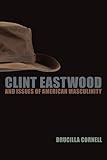Clint Eastwood and Issues of American Masculinity / Drucilla Cornell.
Material type: TextPublisher: New York, NY : Fordham University Press, [2022]Copyright date: ©2009Description: 1 online resource (232 p.)Content type:
TextPublisher: New York, NY : Fordham University Press, [2022]Copyright date: ©2009Description: 1 online resource (232 p.)Content type: - 9780823230136
- 9780823291205
- online - DeGruyter
| Item type | Current library | Call number | URL | Status | Notes | Barcode | |
|---|---|---|---|---|---|---|---|
 eBook
eBook
|
Biblioteca "Angelicum" Pont. Univ. S.Tommaso d'Aquino Nuvola online | online - DeGruyter (Browse shelf(Opens below)) | Online access | Not for loan (Accesso limitato) | Accesso per gli utenti autorizzati / Access for authorized users | (dgr)9780823291205 |
Browsing Biblioteca "Angelicum" Pont. Univ. S.Tommaso d'Aquino shelves, Shelving location: Nuvola online Close shelf browser (Hides shelf browser)

|

|

|

|

|

|

|
||
| online - DeGruyter Church and Society : The Laurence J. McGinley Lectures, 1988-2007 / | online - DeGruyter Citizens or Papists? : The Politics of Anti-Catholicism in New York, 1685–1821 / | online - DeGruyter Civil War America : Voices from the Home Front / | online - DeGruyter Clint Eastwood and Issues of American Masculinity / | online - DeGruyter Coming to Life : Philosophies of Pregnancy, Childbirth, and Mothering / | online - DeGruyter Commemorating Trauma : The Paris Commune and Its Cultural Aftermath / | online - DeGruyter Confederate Phoenix : Rebel Children and Their Families in South Carolina / |
Frontmatter -- Contents -- Preface -- Acknowledgments -- Introduction: Shooting Eastwood -- 1 Writing the Showdown: What’s Left Behind When the Sun Goes Down -- 2 Dancing with the Double: Reaching Out from the Darkness Within -- 3 Ties That Bind: The Legacy of a Mother’s Love -- 4 Psychic Scars: Transformative Relationships and Moral Repair -- 5 Parables of Revenge and Masculinity in Mystic River -- 6 Militarized Manhood: Shattered Images and the Trauma of War -- 7 Shades of Recognition: Privilege, Dignity, and the Hubris of White Masculinity -- Conclusion: The Last Take -- Notes -- Filmography: Clint Eastwood as Director -- Index
restricted access online access with authorization star
http://purl.org/coar/access_right/c_16ec
In this risk-taking book, a major feminist philosopher engages the work of the actor and director who has progressed from being the stereotypical “man’s man” to pushing the boundaries of the very genres—the Western, the police thriller, the war or boxing movie—most associated with American masculinity. Cornell’s highly appreciative encounter with the films directed by Clint Eastwood revolve around the questions “What is it to be a good man?” and “What is it to be, not just an ethical person, but specifically an ethical man?” Focusing on Eastwood as a director rather than as an actor or cultural icon, she studies Eastwood in relation to major philosophical and ethical themes that have been articulated in her own life’s work. In her fresh and revealing readings of the films, Cornell takes up pressing issues of masculinity as it is caught up in the very definition of ideas of revenge, violence, moral repair, and justice. Eastwood grapples with this involvement of masculinity in and through many of the great symbols of American life, including cowboys, boxing, police dramas, and ultimately war—perhaps the single greatest symbol of what it means (or is supposed to mean) to be a man. Cornell discusses films from across Eastwood’s career, from his directorial debut with Play Misty for Me to Million Dollar Baby. Cornell’s book is not a traditional book of film criticism or a cinematographic biography. Rather, it is a work of social commentary and ethical philosophy. In a world in which we seem to be losing our grip on shared symbols, along with community itself, Eastwood’s films work with the fragmented symbols that remain to us in order to engage masculinity with the most profound moral and ethical issues facing us today.
Mode of access: Internet via World Wide Web.
In English.
Description based on online resource; title from PDF title page (publisher's Web site, viewed 03. Jan 2023)


